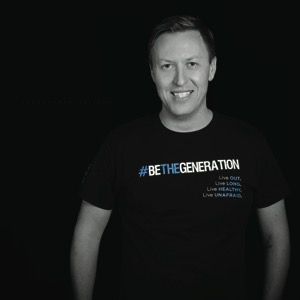
Ian Johnson is ready.
Johnson, the special events director for The San Diego LGBT Community Center, is ready for AIDS Walk. He is the lead staff person for the annual event, San Diego County’s largest HIV/AIDS fundraiser, which will take place Saturday, Sept. 26.
Johnson, the community advocate, is ready to #BeTheGeneration. He plays a key role in The Center’s innovative campaign to end the HIV epidemic by reducing, and ultimately eliminating, new HIV infections.
Johnson, the gay man living with HIV, is ready to help end the stigma associated with HIV by publicly disclosing his status.
Johnson, now 40, was diagnosed more than a decade ago. While he has been healthy and undetectable for a number of years, Johnson recalls that his journey with HIV challenged many aspects of his life.
“I found out after getting really sick. I was told I had infectious meningitis, but they didn’t give me an HIV test. I got sick a couple months after that, and I went in to get treated. This time they gave me an HIV test, but I never went back for the results. I think I kind of knew,” Johnson said. “That was the beginning of my life crumbling apart. I got a letter from the County of San Diego saying they wanted to reach me to talk about a health situation. Sure enough, I found out I was positive.
“I was in such a bad, bad place. At the time, I didn’t have a relationship with my family, and I had moved down to San Diego. I had a stressful coming out, and I was estranged from my family. I did check in with my mom, but that was really it,” he said. “So when I got my diagnosis, I became even more self-destructive.
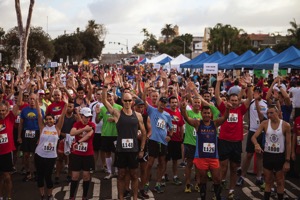
“When you grow up, you don’t have the conversation with your parents about what to do when you become HIV positive. I was so disappointed with myself. I was the good guy. I was the class president. I remember my parents saying they really expected me to go far. I felt like a failure. I didn’t want to accept it, so I was using a lot of drugs. I became homeless. I was living out of my car basically. It was horrible. Now, when I look back on it, I think, ‘Oh my God, it was this long period of time,’ but it was only a couple of years.”
In spite of the estrangement, it was Johnson’s family that helped bring him back from the brink.
“I went to my sister’s wedding, and that was one of the first times I had seen my family in a really long time. There was this spark for me, like ‘What the heck am I doing?’ My youngest brother was in high school and was coming out, and I just thought, ‘How am I a role model for him, the way I’m living?’ Later I found out my sister was pregnant with my first nephew, and that sort of got to me, too.
“That’s when I finally went to the doctor and attempted to get on medication. I started to meet people who were healthier for my life. I started working at Martinis (Above Fourth) and I found support – authentic, caring support from the people I met there. I built up a family in San Diego.”
As things got better for him, it was Johnson’s late mother who also was a constant voice advocating for him to access the best medical treatment for his HIV.
“I attempted medications a couple of times, but I had a horrible reaction to it. I just thought, ‘I can’t do this.’ When my mom passed away, it was a big wake up call for me. She wanted me to get on medication. Every phone call was, ‘Have you started medication?’
“So, I tried again. In addition to the physical side effects, starting a medication regimen was going to be a daily reminder that I was living with HIV. I had to get over that, and I hope to help other people get over that hurdle as well,” Johnson said.
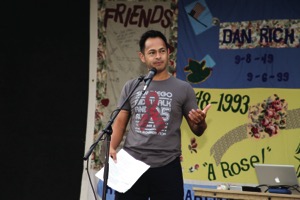
“I started on Stribild, and it completely changed my life. It was a big step, but I have now been undetectable for years. Being undetectable gives you hope about everything. It helps with the stigma associated with dating since the chances of me giving it (HIV) to a partner are almost non-existent. It’s a weight off the shoulders. I think it makes living with HIV that much easier,” he said. “You have to be made a certain way to deal with an HIV diagnosis. But being undetectable is the best feeling ever. Screw the stigma. I know I’m going to live a long, healthy, normal life.”
“Ian’s situation is a great example of how HIV has changed over the years,” said Dr. Delores A. Jacobs, chief executive officer of The Center and the architect of the #BeTheGeneration campaign.
“HIV is a very different disease in 2015 than it was in 1995 or even 2005,” Jacobs said. “With treatment, those who are HIV positive can become undetectable, thereby reducing the odds of infecting a sexual partner by more than 99 percent. For those who are HIV negative, the utilization of PrEP, or Truvada, has been proven to prevent HIV transmission. So if the folks who are negative are protected, and the folks who are positive are on treatment that gets them to undetectable levels, we can effectively end new HIV transmissions, and bring an end to the epidemic levels of HIV/AIDS.”
But HIV stigma still has its impacts, whether the damaging messages took place two decades or two weeks ago. Johnson recalls when he was first infected, having to tell his bosses so they could make sure to take any precautions if he got a cut at work, and the concerns expressed about him serving food.
“That stigma just holds us back,” he said. “I’ve been worried about what people are going to think, or what they are going to say – that they won’t like me because I’m positive. I’ve already experienced that. There’s sometimes a sense that my life doesn’t have the same value as the life of someone who is not positive. For me, the hardest thing about being an HIV-positive person hasn’t been dealing with my health and my diagnosis, it’s been dealing with the stigma associated with it.
“Everyone has the right not to date someone with HIV, but when you reveal your status, and that rejection happens repeatedly, it takes its toll,” Johnson said. “You have to think about when is the appropriate time to tell someone – do you tell the person before you even go out? Do you tell them after the first date, or wait until they get to know you a bit so they don’t judge you based only on your HIV status? Everybody has their coming out stories. When you are living with HIV, there’s a whole other coming out process.”
While Johnson now enjoys a leadership role at The Center, he hasn’t forgotten the HIV/AIDS service organizations that were there for him during some of his darker days.
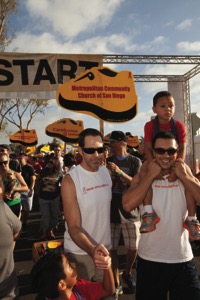
“When I was living out of my car, I didn’t know where to go. I had been to The Center when it was on Normal Street. I called The Center seeking resources, and asking where I could go for a doctor. They referred me to Being Alive’s resource book, and that resource book saved my life. I got a case manager at Family Health Centers. They helped me so much. I didn’t have insurance, so they got me on Ryan White. I got a doctor at the Owen Clinic, and I still have that doctor. I got dental treatment; they got me on ADAP (AIDS Drug Assistance Program). I’ve been on the flip side of where I am today. I’ve been a recipient of these services; I have benefitted from these services. If I didn’t have those resources, I don’t know …”
In 2006, Johnson helped start an AIDS Walk team for Martinis to pay tribute to Brent Glover, a roommate who died of AIDS-related complications. By 2007, his enthusiasm and effectiveness led him to serve as the AIDS Walk Teams Coordinator in a short-term assignment. Today, as The Center’s director of special events, he is responsible not only for AIDS Walk, but also for Dining Out for Life San Diego, another large-scale HIV/AIDS fundraiser.
“Sometimes I’m amazed by it; by where I’m at today,” he said. “I feel like I overcame a lot, but it made me who I am today. I have no regrets – this is exactly who I’m supposed to be.
“I remember one of the first AIDS Walks I ever did, getting goose bumps when I crossed the finish line,” Johnson said. “It’s very special to me. At the Walk, you see moms and grandmas carrying a sign in memory of a son or grandson they lost, but there still are not that many people who are open about their status. I hope (by coming out about his own status) that those people who say they don’t know someone who is living with HIV, will now know that they do. I hope that those who are living with HIV, but may not be accessing medical treatments, will have the courage to do it because it changes your life. It takes away the pressure. And, I hope people will talk about it more.”
Last year, The Center launched #BeTheGeneration, a multi-pronged campaign to end new HIV transmissions in San Diego County. In part, the campaign’s goals are to end stigma; provide education about medical treatment options; make routine HIV testing more widely available; and to increase access to vital medical care, pharmaceuticals like PrEP and PEP and condoms. It’s a campaign that has truly impacted Johnson, both professionally and personally.
“Not even all my colleagues knew I was living with HIV when we started talking about this campaign,” he said. “One of the messages is to live out, live proud and end the stigma. People are asking questions, and the conversations about HIV are happening again. The voices of those with HIV haven’t been as loud lately, but I think this campaign is helping to change that and I think that’s critically important. It’s helped me be more open about who I am, and the ways in which I have taken responsibility for, and managed, my HIV and my overall health. I want to encourage and support others to do that as well. #BeTheGeneration is changing lives.”
Johnson laughed a bit when asked about his goals for the future. But today, he is “closer than ever” with his family, relishes his role as an uncle, has good friends and a job he loves.
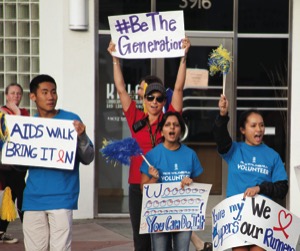
“The possibilities are endless for me right now, and I’m open to everything. It took me a long time to get over thinking that my life was going to end early, and to accept that I am going to have a long life,” he said. “I am much more comfortable in my own skin, and I’m proud of who I am. I know I have value, I’m doing important work and I am worthy of love.
“I want to continue to do the work I do, which I know is making a positive impact. I love taking on new challenges. I also want to use my voice to help educate those afraid of what HIV is,” he said. “I hope I can make it easier for those who are newly diagnosed to see that life is going to be alright. I will continue to live my life to fullest – happy and excited for my future.”
Ian Johnson is ready.











I am a long time friend of Ian and have seen some of the struggles he has faced. I can honestly say I have known so many people who either given up or lived in denial but Ian is never been one of them. He is one of the strongest most genuine people I have had the honor to know and be friends with. If there is anyone who can shine brighter and set an example for others it’s definitely Ian. I can’t express how proud I am of him and the things h’s accomplished since we first met. What a truly amazing man he is! Thank you for being who you are Ian!